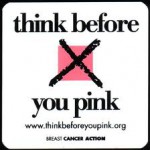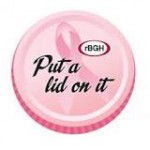On Friday, February 24 there was screening of the documentary Pink Ribbons, Inc. at Smith College. As the recipient of the Smith College Medal for my work as a breast cancer activist, I gave a talk introducing the film. That speech is presented here as I gave it. Imagine a hall with 150 or so souls on a cold, wet Friday night in Northampton, Massachusetts . . .
Hello, and thank you for being here this evening.
I want to start with a question: will you please raise your hand if you know someone who has or has had breast cancer?
As you will see in the film, if you raised your hand, you are certainly not alone. Almost
everyone knows someone with breast cancer. But the other thing you will see in this film is that breast cancer has somehow become good news. Something to celebrate, sing about, dance about, and certainly walk for.
When I had breast cancer at the age of 42, I didn’t feel like celebrating. What’s to celebrate about a life-threatening disease whose treatments amount to — as Susan Love puts it — slash, burn and poison?
Breast cancer hasn’t changed, and its treatments haven’t changed that much since I was 42, 18 years ago. And they hadn’t changed much for many years prior to my diagnosis either. There’s been some progress on the treatment side, but certainly not enough to jump up and down about. And there’s been little if any movement toward true prevention — keeping people from getting breast cancer in the first place — by identifying and eradicating its causes.
What does the general public know about breast cancer? I would argue not much. They know, or think they do, that getting mammograms is the key to beating breast cancer. Some people think mammograms prevent breast cancer, but that can’t be true because, when they work, they find cancer that is already there. Mammograms are a detection device, and a far from perfect one. Detection and prevention are different. Very different.
The public also knows, or thinks it does, that early detection is the key to survival. But early detection works only for the women whose cancer is both life-threatening when found and treatable with currently available therapies. It isn’t necessary for women whose cancer, when found, is not life threatening, and it doesn’t work for women whose cancer, though very small, is so aggressive that it cannot be effectively treated.
And, of course, the public knows that the pink ribbon is the symbol of breast cancer. You’ll learn from the film how that came to be, so I won’t ruin that story.
People say to me that the pink ribbon — on lapels, on products as varied as toilet paper and hand guns — helps raise awareness of breast cancer. My argument is that, thanks in part
to the pink ribbon, everyone is now aware of breast cancer,
unless they are living under a rock. Isn’t it time to move beyond awareness to activism to change the course of the epidemic?
If you think doing a walk for breast cancer, or a run, or a mountain climb is the way to end the breast cancer epidemic, the film you are about to see will, I hope, convince you otherwise.
And if buying a product with a pink ribbon on it would help end the epidemic, it should be over by now, given all the breast cancer shopping that people do. After all, if shopping could cure breast cancer, it would be cured by now.
There is also that “click-on-this-link” kind of activity for funding things like mammograms for poor women. Sounds like a simple and good idea. It is simple, but, like many simple things, it’s not so good. It turns out that in 2007, for example, it took 5 million clicks to fund a total of 129 mammograms. There has to be a better way to provide health care.
As Susan Love says in the film you are about to see, if this is the way we approach breast cancer, we’re missing something big. The kind of activism we need is concerned with the larger context, the notion that we should evaluate the messages we get about breast cancer and breast cancer awareness in light of the issue of how we approach research and provide health care. It means challenging the corporations and organizations that stand in the way of better lives for women.
One way to do raise those challenges is to Think Before You Pink. This is a campaign that  was started in 2002 by Breast Cancer Action, the kick-ass organization I had the privilege of leading for 15 years. It focuses on cause marketing: the practice of companies putting a pink ribbon on products to try to increase sales of their products. It provides 5 questions to guide you as you think about these promotions:
was started in 2002 by Breast Cancer Action, the kick-ass organization I had the privilege of leading for 15 years. It focuses on cause marketing: the practice of companies putting a pink ribbon on products to try to increase sales of their products. It provides 5 questions to guide you as you think about these promotions:
1. How much money from your purchase actually goes toward breast cancer? Is the amount clearly stated on the package?
2. What is the maximum amount that will be donated?
3. How are the funds being raised?
4. To what breast cancer organization does the money go, and what types of programs does it support?
5. What is the company doing to assure that its products are not actually contributing to the breast cancer epidemic?
Let me give you a cause marketing example that’s mentioned in the film. It’s about KFC, Kentucky Fried Chicken. A couple of years ago, KFC partnered with the Susan G. Komen
for the Cure Foundation. For every pink bucket of fried chicken that KFC sold, they promised to give 50 cents to Komen. Here’s the hitch. In case you didn’t know, KFC food is really not good for you. And it’s sold mostly in economically poor neighborhoods where better food options are hard to find. A lot of nutritionists pointed out this problem and threw up their hands about what could be done about it.
Breast Cancer Action knew what to do about it. We started a campaign to get people to contact KFC and Komen and tell them what they thought of the campaign. We called it “What the Cluck?” Thousands of people took action. While Komen raised a lot of money from the KFC campaign, they didn’t come very close to their $8 million goal, and they took a lot of flak from former supporters about the partnership. KFC was not willing to take that kind of heat two years in a row. They are no longer a Komen partner.
There are other examples in the film. I’ll let the movie tell those stories, but keep an ear tuned for the rBGH and General Mills tale in the film. It speaks to the power of ordinary
people to create meaningful change.
Not covered in the film is the controversy that was in the news for many days a few weeks ago, involving Komen and Planned Parenthood. In case you missed the brouhaha, it involved a decision by Komen to stop funding Planned Parenthood to do breast care services like breast exams and referrals for mammograms. Komen claimed there weren’t politics involved. Instead, they said they had a new policy not to fund any organization that was under investigation. It so happened that Planned Parenthood was the only organization that Komen was funding that fell under this new guideline.
Turns out that Planned Parenthood is under investigation by an anti-abortion Republican Congressman who was encouraged to go after the organization by a pro-life group that is furious that Planned Parenthood does abortions.
When the news of the Komen decision became public, a firestorm of public opinion erupted. People complained that women’s health was being politicized, that Komen was undercutting poor women who get health care at Planned Parenthood, and that Komen had taken sides in the abortion debate, which has nothing to do with its mission.
Komen responded to the public outcry by claiming its move was not political and then reversing its decision, agreeing to continue funding Planned Parenthood this year.
End of story? Not so fast. The move by Komen and the public outcry in response to it revealed some other things about the breast cancer organization that are now under scrutiny. Like the fact that Nancy Brinker, the founder of Komen, told one story and then another explaining the Planned Parenthood decisions, neither of which made sense. Like the connections of the leadership of Komen to Republican political candidates and causes. Like the proportion of money that Komen gives to breast cancer research has been declining (to 15% of its budget) as their revenues have increased. Like the support given to
Komen by selling pink handguns. Like Komen’s denial of the toxicity of BPA, even though studies have shown that BPA interferes with the effectiveness of some breast cancer treatments. The list is growing.
What surprised me was that people were shocked that women’s health was being politicized by the Komen decision. Women’s health has always been political, because it’s about women struggling to get what they need for their health from a system designed by men for the needs of men.
Breast cancer is no exception. Breast cancer has been political since people noticed years ago that the disease — which primarily affects women — got far less research funding than cancers that primarily affect men. That isn’t the case any longer, but it’s where the politics of breast cancer started.
Since then, and in many ways because of that effort to increase funding for breast cancer research, a breast cancer movement has come into existence. Like all movements, the
breast cancer movement covers a spectrum — from left to right or right to left, depending on where you want to start.
One way to think about the different ends of the spectrum is to consider the kinds of questions that organizations ask at either end.
Toward the right end of the spectrum, groups ask questions like these:
— How can we get more money into breast cancer research?
— Are there drug companies that we can partner with to advance our mission?
— Are there scientists who are willing to tell us what direction breast cancer research should take?
— Are there corporate partners who will fund our work?
— Is there good news on breast cancer for which we can take credit?
Toward the left end of the spectrum, groups ask questions like these:
— With all the money that has been invested in breast cancer research, shouldn’t we have better treatments and know more about the causes of breast cancer?
— Will individuals fund our work if we refuse to take money from companies that profit from cancer?
— What direction do people affected by breast cancer want the research to take?
— What are the strengths and weaknesses of the latest research study, and what does it really mean for patients?
— What companies are making products that may increase the risk of breast cancer and how can we organize people to get them to stop?
Some of this spectrum is evident in the film you are about to see. If you think critically, as Smith has taught us to do, about the breast cancer issue, you’ll never see a pink ribbon the same way again. Enjoy the film.
To find out where the film maybe showing near you soon, visit the website of First Run Features, the U.S distributor. It’s already in theaters in Canada.
© Barbara A. Brenner 2012








I want you to know that I was ready to hop in my car on Friday for the 3 hr drive to Smith. The movie is being screened by my home on March 28th. I did not want to wait another month.
I’m anxious and the clock is ticking and enough, quick frankly is E-NOUGH. There’s been “some progress” on the treatment side, yes. Minimal, as you pointed out….. and in the case of my mom and me with 19 years in between our diagnoses….. No change whatsoever.
We know those treatments come at a great cost to many of us. There is a study just published today in the Journal of Clinical Oncology telling us what WE already know. My own personal hell-chemobrain…. From CMF which was the poison of choice in my case….. Fallout 20 years AFTER the fact. Validation is great. And it sucks.
Holding you close in thought. Will be a rebel rouser in Huntington on March 28th.
I think it’s the pink handguns that gets to me most…. WTF????? Buy a lethal weapon to support breast cancer “research”?
Wow, Barbara, you rule! I must say, I particularly admire the pink handgun. Possibly even more deadly than Kentucky Fried Chicken…
I get “slashed” in a week. I’ll learn about the chemo fog sometime after that. I’m pissed that alternative treatments are effectively locked out of the treatment protocol. The only thing they want to push is more poison, and I’m damned sure that the poisons I have already been exposed to (by the FDA, USDA, USA, NWO, CFR, TC, Monsanto, etc) are the reason I have breast cancer now.
What a wonderful speech and congratulations on your medal! Your tireless advocacy is admirable indeed. Thank you so much. I’m definitely sharing this. It’s so important. Thank you again!
Barbara, this blog post couldn’t have come at a more opportune time for me with regard to work I’m doing in the Republic of Georgia. The opening paragraph of a Peace Corps Georgia health committee newsletter on breast cancer for women in Georgia stated, “Breast cancer is treatable when detected early, which means the leading cause of death for these women is preventable.” As you may have guessed, the article was promoting a mammography program and Komen’s upcoming walk in Georgia. When I read this, I nearly went through the roof. Along with my own 12 paragraph rebuttal and providing resources, I now have your blog post to provide them with the facts. As always… thank you.
Thanks so much, Amy! As the late, great poet June Jordan said, each one, teach one!
Thanks, Barbara! It seems that the information I provided was compelling enough to be invited to publish an article about breast cancer that focuses on environmental toxins, social inequities and screening in the next Peace Corps Georgia newsletter. It’s going to be one long piece!
Barbara: Thank you for sharing this speech. The timing for Pink Ribbons Inc. couldn’t be better now that the public is ready to scrutinize more seriously what is happening with all of the money, publicity, and “awareness” surrounding the cause of breast cancer. I hope this film will reach audiences far and wide! I’d love to share your speech in its entirety on the Pink Ribbon Blues Blog if that’s okay with you. Thank you for your continued work. — Gayle Sulik
Hi Barbara. I’ve just finished my slash/poison/burn tour of duty and am now into the five-years-of-scary-medication, what-the-hell-happens-next phase. Finally feeling up to it, I’ve plunged into the ‘breast cancer blogosphere’ (for want of a better term) to try and get a better handle on this disease and make some cyber-connections. I’ve only just started this exercise, but have already learned an enormous amount about the ‘politics of breast cancer’. I’m feeling downright embarrassed about my previous level of understanding of breast cancer – I like to regard myself as a critical thinker, but now realise that my BRAIN had been pinkwashed!! Your speech is terrific – I will refer friends to it – and I am hoping that the film gains cinema release in Australia (and soon). Congratulations on your award. I will enjoy plundering your archives and am about to put you on my blog roll!!
All the very best from monsoon-drenched Darwin…
Liz